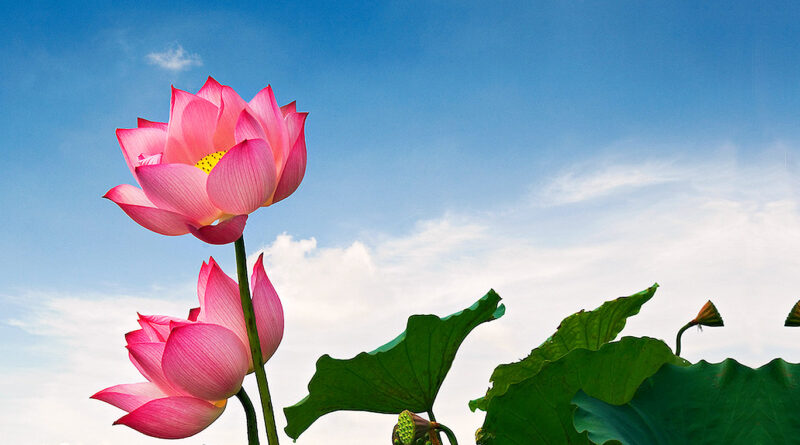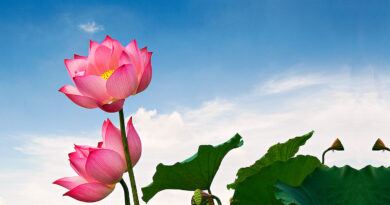AWE
Awe
When we use the phrase, “going out into the elements,” we’re not usually talking about warm breezes of a mild spring day. We’re talking about when the wind, water, earth, and fire are showing their extremes—like tonight, with the cold wind and rain, the thunder, the lightning. This is actually a theme of meditation: thinking about the physical elements, about how huge and awesome they are. The perception of the elements goes together with the perception of wilderness as a way of cleansing the mind of its small everyday concerns, the concerns that otherwise loom so large. These perceptions help you realize how small you are, or at the very least how small your body is: your little bundle of earth, wind, water, and fire right here.
That’s one of the reasons the Buddha recommends going out into the wilds, into the elements. It’s a way of gaining perspective. For instance, he talks about leaving a village and going out into the wilds: You sit down and you hold in mind the perception that you’re out in the wilderness, and it’s a very different perception from being in the village with human beings. Whether the village is a small village in Thailand or the global village on your TV, you come out here and those concerns just drop away. You think of yourself being surrounded by nature, surrounded by wilderness. It can be a refreshing perception, but it also carries an edge. Wilderness is big and contains dangers. You realize how small your body is, and how vulnerable, and you feel a sense of awe.
That awe is a useful emotion. It’s very close to samvega. In fact, one of the meanings of samvega is fear, awe, or terror. It’s one of the primary emotions in the practice: realizing how vulnerable the body is, and as a result, how vulnerable your mind is. This body that you care so much for, that you’ve looked after since you were able to look after it, all these years: It’s such a small thing. The wind we had today could have reached the point of tornadoes, and who knows where the tornadoes might have landed. They could have wiped out the monastery, wiped out other people’s homes and businesses.
And that’s just the wind. The rain can wash whole hillsides away. There have been fires that have come through the immediate area and have burned thousands of acres. When I first saw the fire that forced us to evacuate the monastery three years ago, my first thought was: “Nature’s trying to kill us.” There’ve been earthquakes. These things happen all over the world.
When we see the results of, say, an earthquake, it’s shocking, realizing that we live on an earth that, with a small shrug, can do this to human beings. As soon as you lay claim to the physical elements of a body, you’re exposed to the physical elements of the world, regardless of where you are, and those outside elements can crush the body without a moment’s thought.
When you’re out in the wilderness, you’re even more conscious of that fact. Years back, I was up in Alaska, camping at the Arctic circle, and even though it was summer—which meant that it was relatively mild—there was still a very strong sense that for hundreds of miles around there was just nothing but nature and more nature—and nature didn’t care about you at all. You could die and it would be totally indifferent. That gave rise to a sense of awe. It was a real help in practicing concentration, in getting the mind to settle down. On the one hand, the disturbances of being involved in human society were not there. But on the other, nature seemed so much bigger and implacable. Down here in the lower 48, wilderness is just little islands surrounded by a sea of civilization. Up there, it’s the other way around. Civilization is little islands and the wilderness is the sea. It’s all around, and very sobering. That kind of sobering thought is very useful in the meditation, for it helps to still the mind.
Sariputta recommends a similar reflection: Think about the different physical elements in the body. You realize that these elements are the same elements you see outside when there’s a storm, a wildfire, an earthquake, a flood. When those elements outside can change in such radical ways, what about this little body you’ve got here, composed of the same elements? Is there anything constant there? Anything you can really lay hold to as your self or yours? And in response to that question, he says, the body has only a No. It denies your desire for ownership.
So it’s useful to develop this sense of awe. It helps put things into perspective, that these things we hold onto—the physical body, the affairs of our daily lives, the ups and downs, the concerns about what this person thinks, what that person says, what’s going to happen to me, what’s going to happen to the people I love—are eventually all going to die. In one way or another, the elements are going to take over. They’re going to take everything back. These things we’ve claimed to be “us” or “ours” are going to show that they know nothing of our claims. They have no respect for our claims. That thought focuses you inside: What do you have? You’ve got just your awareness. You’ve got the mind. What shape is the mind in?
Fortunately, the Buddha doesn’t leave us stranded here. All too often in the West, this sense of awe is left simply as an aesthetic sense or a vague religious feeling. But the Buddha gives you further instructions on what to do with it. Take that sense of the earth and think just of the earthness of the earth—or the windness of the wind. Don’t focus on any of the little details. Make the earthness of earth, and how vast it is, the object of your concentration. Allow your awareness to take on some of that vastness and then learn how to hold it there.
If the elements seem threatening, think of the vastness of space, the space that penetrates all of this activity of the wind and fire and rain. Space penetrates the walls of the meditation hall, the floor, the roof, everything. There’s space in all directions, all around us. Learn how to hold that perception. That can form a basis for concentration, and concentration of that sort can put the mind in the right state to reflect on things in their proper perspective: to look at where you cling to things, and what might be in your best interest to let go. If you’re looking for your happiness in something that the elements could destroy, don’t think you have a special pact with them. They’re large and overwhelming and don’t give a damn.
But you can escape their influence; you can escape their power. That’s why we’re practicing here: to find something that’s not subject to all this wind and rain and the movement of the earth, the potential for fire. This is a very useful contemplation on not-self: the undependability of the elements, the stress of trying to find happiness in something that these elements could destroy. Even if it’s not yet being destroyed outright, these elements are just wearing away, wearing away the elements of the body, the faculties of the body, our abilities to see and smell and taste and hear. To think in these ways really helps us to let go of the attachments that are causing us suffering, that weigh the mind down.
So here we are in the midst of a storm. But there’s something deep inside that doesn’t have to suffer from the storm, doesn’t have to be threatened by the storm. Even though we may reflect on the awesomeness of the powers of nature and how huge they are, there is something in the mind that’s even more enormous, more solid, than they are. It can be found through our own efforts, and it offers a security that you can’t find in any place—because it’s outside of places. There’s a recurrent phrase in the Canon of the arahant’s being “released everywhere,” which means released from every where, every place. That idea’s awesome, too. The reality of it, once you’ve touched it, is even more awesome than the idea.
It’s always helpful to keep these thoughts in mind.



